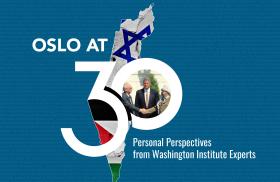
- Policy Analysis
- Fikra Forum
The Palestinian Authority, a Flawed but Necessary Legacy of Oslo

Part of a series: Oslo at 30
or see Part 1: Oslo at 30: Personal Perspectives from Washington Institute Scholars A Compendium
While insufficient, a collapse of the Oslo edifice would come with a hefty price for the Palestinians, not only as individuals but also as a people seeking self-determination.
The Palestinian disenchantment with the Oslo process is understandable. After all, the appeal of the process to the Palestinian public centered around the promise of achieving independence and ending the occupation. Failing to do so, it has instead produced ongoing conflict with Israel and a divided Palestinian polity with two governments whose only commonalities are corruption, poor governance, and authoritarian policies and practices. (The Israelis, for their part, were promised security and acceptance, but feel they have received continued terror and delegitimization instead.) Yet for all of its shortcomings, the Oslo process served and continues to serve key Palestinian interests, and a collapse of its framework could deal a mortal blow to Palestinian national aspirations.
A Way Back to Relevance
As Israeli and Palestinian negotiators initially met near the Norwegian capital in 1993, the Palestinian national movement was at one of its lowest points. In the aftermath of the ill-advised decision of the Palestine Liberation Organization (PLO) to support Saddam Hussein’s occupation of Kuwait, the PLO found itself regionally isolated and bereft of Arab financial and diplomatic support.
This marginalization was on vivid display in the 1991 Madrid Peace Conference and the ensuing Washington talks. Since assuming the leadership of the PLO in 1969, one of the core principles guiding Chairman Yasser Arafat was the struggle to gain recognition of the PLO as the “sole legitimate representative of the Palestinian people” and to defend it against any perceived signs of Arab encroachment on Palestinian representation.
Yet by late 1991, the PLO was so weak as to accept the representation of Palestinian interests by non-PLO members as part of a Jordanian-Palestinian delegation. While the PLO leadership maintained enough sway to instruct Palestinian delegates to these talks to adopt inflexible positions, this obstructionist approach was unsustainable. The Oslo Accords reversed this trend and placed the Palestinian issue back into regional and global diplomatic center stage.
But Oslo was much more than a mere tactical maneuver to diplomatically rehabilitate the PLO. Palestinian self-determination, while long accepted internationally, had up to that point lacked any means for its realization. The Oslo process created such a pathway. Israeli recognition of the PLO as “the representative of the Palestinian people” provided the legal and diplomatic framework for a negotiated settlement, while the creation of the Palestinian Authority established the physical and institutional foundation for such a resolution. And even though a Palestinian state was not mentioned in the Accords, they nevertheless created a logic that ultimately led to Israeli PM Ariel Sharon and US President George W. Bush adopting the two-state solution as formal Israeli and U.S. policy while rendering the creation of a Palestinian state alongside Israel a matter of international consensus.
A Fleeting Moment with Some Tangible Results
It is a common sentiment that Oslo is dead. And many of its provisions have indeed become defunct, while two of its core pillars, the two-state solution and the PA, are under extreme stress. One would be hard-pressed to find a single world leader today who believes that a two-state solution is at hand and, accordingly, there is no diplomatic appetite to invest in its realization. More worryingly, the Israeli and Palestinian publics are abandoning it, and significant leaders in both societies actively oppose such a vision. On the ground, senior ministers in the current Israel government are pushing policies that challenge the physical viability of a future solution, primarily through the unchecked expansion of settlements deep within the West Bank. Concurrently, terrorism from Palestinian factions and individuals is resurgent, with the PA unable to exert its security control in areas under its authority.
For its part, the Palestinian body politic is going through its own deep crisis of legitimacy. The question of Palestinian representation is being challenged, though from within Palestinian politics in the form of Hamas rather than from external actors this time around. Moreover, the PA is rife with corruption and poor governance—it operates like many neighboring dictatorships to limit the political space and is fiercely resistant to any efforts towards political rejuvenation. As a result, it is drifting gradually but inexorably towards domestic and diplomatic irrelevance. Most Palestinians today see the PA as a liability rather than an asset, while many international and regional actors view it as an unappealing interlocutor.
Yet for all those ailments, the basic structural components of Oslo remain alive. The two-state solution remains a subject of international diplomatic consensus. While this does not currently translate into any diplomatic initiatives, it continues to frame and inform the positions and policies of various international actors. It likewise puts some constraints on proposed policies that would undermine it and would have otherwise gone unchecked.
And for all its shortcomings, the PA continues as a framework for the Palestinians to govern themselves and build the institutional nucleus for any future statehood. While many Palestinians aspire to a cleaner, more efficient, and more responsive government, the PA is not particularly worse than many other regional governments that are unsatisfactory yet sufficient to run a state. Moreover, as the tenure of former PA prime minister Salam Fayyad demonstrated, reforming and upgrading the PA’s institutions can be done reasonably quickly when there is the requisite political will. At a diplomatic level, despite the well-founded international complaints, the PA remains an address for international diplomatic engagement (albeit through the useful fiction of the PLO), ensuring a Palestinian presence on the international scene.
The Impact of a Collapse for Palestinians
While these Oslo structures have proven resilient and enduring, the possibility of the collapse of this edifice is becoming increasingly harder to dismiss. Were this to pass, it would be an unmitigated disaster for the prospects of Palestinian self-determination.
Today, the PA is the only remaining relevant Palestinian national political structure. A collapse of the PA will likely usher the collapse of the Palestinian national movement. Palestinian identity remains strong. Yet absent political institutions, the ability to effectively translate this identity into political and diplomatic gains will disappear. The former vehicle of the PLO became a diplomatically expedient shell alongside the inevitable diversion of financial, political, and human resources into the establishment and management of the PA. For its part, Fatah—particularly under President Abbas—has come to resemble many similar ruling parties in the region and beyond: too identified with and enmeshed in the PA to survive the latter’s collapse.
It may be tempting to think that the whole-cloth collapse of these moribund structures would clear the way for the emergence of something better. Such an assumption, however, runs counter to both Palestinian history and experiences elsewhere. For one thing, there is no guarantee that the Palestinian national movement could reconstitute itself after a collapse. After all, history books are littered with the detritus of failed national movements. And even if something new were to emerge, such a process would take a generation at least, with no assured end result. The one certainty is that such a process would be bloody and disruptive, mainly for the Palestinians themselves.
For its part, Hamas may survive such a collapse—and may even benefit from it—but it has serious deficiencies that severely constrain its ability to develop into an effective and acceptable representative of the Palestinian people. Its ideological nature will always limit its ability to be a big-tent, representative organization. Regionally, the Muslim Brotherhood label to which Hamas continues to adhere is not only publicly discredited but also proactively opposed by major Arab governments. And its continued use of terror makes it an international pariah.
Similarly, the collapse of a two-state solution as an end objective will be to the detriment of Palestinians. The two-state solution remains the only possible option for the realization of self-determination of two peoples, the Jewish and Palestinian peoples, who deserve this right. Any alternative will inevitably come at the expense of either or both national groups. The continuation of the status quo—which, despite all claims to the contrary, has proven quite sustainable for more than five decades—will mean the continued denial of Palestinian national aspirations. The newly-resurrected “one state solution” presupposes that one of the two nations will subordinate its self-determination to the other, or that both will abandon theirs in favor of a post-nationalist state—a rarity even in less contentious parts of the world. And while political and legal means may improve the rights of Palestinian individuals and communities, the conflict was never about civil and political rights. It was always about national aspirations. Any proposed solution that fails to take account of nationalism is, at best, ahistorical and at worst disingenuous.
Averting Collapse
Yet for all these arguments, the repeated setbacks of the Oslo process have come with a price in the form of lost credibility among the Palestinian public. To avert further erosion and possible collapse—which would harm Palestinians, Israel, and neighboring states alike—a number of policies need to be adopted.
First and foremost, policies that foreclose the future possibility of a two-state solution must be halted, be they policies that advance settlements in areas deep within the PA that make future separation physically impossible or ones that either purposefully or inadvertently lead to the collapse of the PA—and with it the collapse of a Palestinian address for future settlement.
Beyond avoiding harm, policies need to be put in place to rehabilitate the very idea of cooperation, particularly for younger Palestinians and Israelis. This generation has come of age after 2000 and has not experienced the hope and cooperation of the 1990s, witnessing instead Oslo’s subsequent failures. Such a shift cannot be achieved through resumption of negotiations that will inevitably fail given the state of Palestinian and Israeli politics. Rather, it must be accomplished through concrete, politically viable spheres that can visibly demonstrate the feasibility and value of cooperation to both sides. In this regard, future expansion of the Abraham Accords could provide a vehicle for the implementation of such moves.
Finally, no matter how compelling the message is—and, let’s be honest, arguing for Oslo is an uphill battle—it cannot be favorably received if the messenger is suspect. In this case, the PA as a governing body and Fatah as a political movement are the messengers, and unless they are reformed and rehabilitated, Oslo itself cannot be rehabilitated in Palestinian eyes. Within this context, the idea of Palestinian elections should be approached with extreme care. In today’s environment, the loser in any elections—be it Fatah or Hamas—is highly unlikely to respect the result, and an election that fails to change reality will only deepen dissatisfaction.
For all its unfulfilled promise, and for its many shortcomings readily apparent in hindsight, the Oslo process was a historic breakthrough for the Palestinian quest towards self-determination. It created the first instance of Palestinians governing themselves on their own territory, established a future two-state solution as a subject of international consensus, and created diplomatic and institutional pathways towards its realization.
Today, many of these achievements persist. Yet the failures are also real, and the disenchantment with Oslo is the overwhelming sentiment among Palestinians. Understandable as such disenchantment may be, a collapse of the Oslo edifice will come with a hefty price for the Palestinians, not only as individuals but also as a people seeking self-determination. The “burn-it-to-the-ground-and-start-anew” approach may be emotionally satisfying, but a wiser, more responsible course would dictate preserving Oslo’s achievements and addressing whatever shortcomings that can be addressed in today’s environment until a more opportune moment for high diplomacy is reached.




